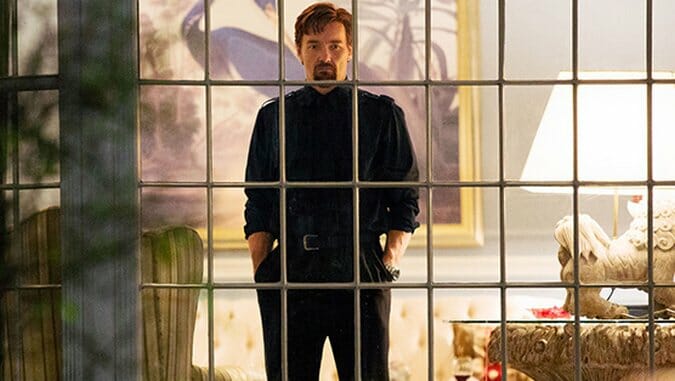The Gift

Actor Joel Edgerton’s debut feature as director, The Gift, is the best kind of great movie: It doesn’t announce itself as great at all. Edgerton, who also wrote the screenplay, knows he’s got the goods in his grasp, content to let his ideas slowly get under the audience’s skin and gestate, rather than ram them down our throats. Although a cursory glance at its plot (or a quick viewing of the film’s trailer) might indicate that The Gift is a run-of-the-mill stalker film, nothing could be further from the truth: Edgerton begins with a set of familiar conventions and then overturns each one scene by scene, letting his characters and themes evolve in a manner far more naturally than one might expect from a genre film, or from a summer horror movie—which of course makes it all the more terrifying.
Edgerton lays out his core situation with clarity and concision in The Gift’s opening scenes, in which his subtle, gliding camera pulls the audience into the world of married couple Simon and Robyn (Jason Bateman and Rebecca Hall). They’ve just moved from Chicago to the suburbs of Los Angeles, primarily for Simon’s job but also to get a new start following the emotional trauma Robyn experienced following the loss of a baby. Edgerton’s eerily still and angular compositions, in which Simon and Robyn are repeatedly framed through glass, like bugs under a microscope, create a sense of unease right from the start, implying that the couple is on shaky ground even before Simon’s old high school classmate Gordon (Edgerton) shows up. Gordon quickly insinuates himself into Simon’s and Robyn’s lives, and by the time Simon takes action to try to rid himself of the socially awkward and clingy friend, it’s far too late.
To describe much more of the plot would be to rob the viewer of one of The Gift’s many pleasures—its constant ability to surprise—but suffice it to say: Edgerton begins by hitting all of the beats familiar to fans of Fatal Attraction, Single White Female and their countless imitators, but it becomes obvious early on that he’s not going to play by their rules. When he does cull a familiar trope from other stalker movies, he repeatedly upends both the audience’s and the characters’ expectations. Yet the twists aren’t gimmicks—Edgerton isn’t merely being a contrarian, but following through on the very real, deep psychological tensions at the core of his film’s triangle. I can’t think of another recent movie that so skillfully plays with audience identification, shifting our sympathies from one character to another in a manner darkly mirroring that of the films of Jean Renoir. If, in that director’s masterpiece Rules of the Game, everyone had their reasons, here they do as well—reasons for lying, hiding, manipulating.
-

-

-

-

-

-

-

-

-

-

-

-

-

-

-

-

-

-

-

-

-

-

-

-

-

-

-

-

-

-

-

-

-

-

-

-

-

-

-

-








































